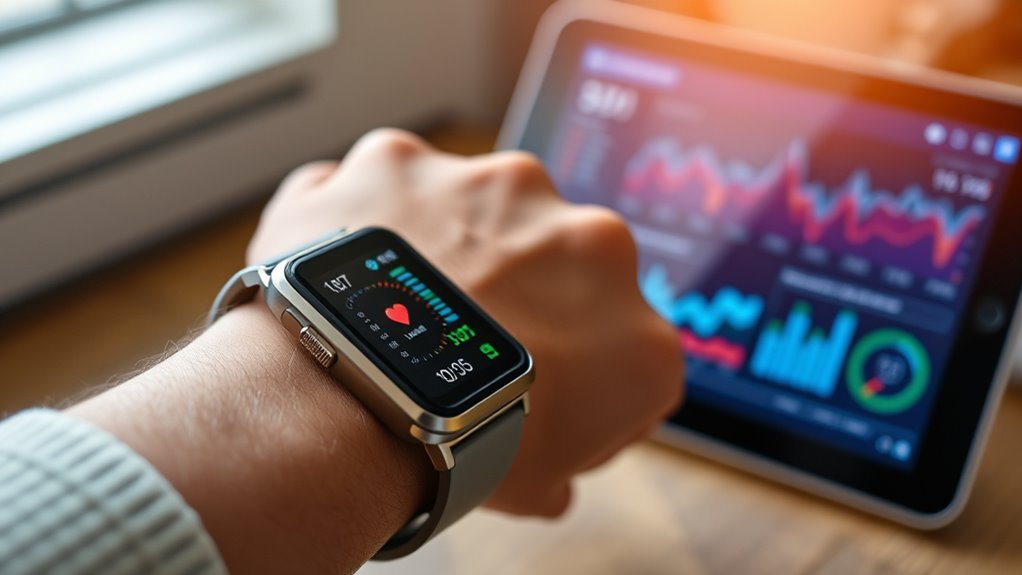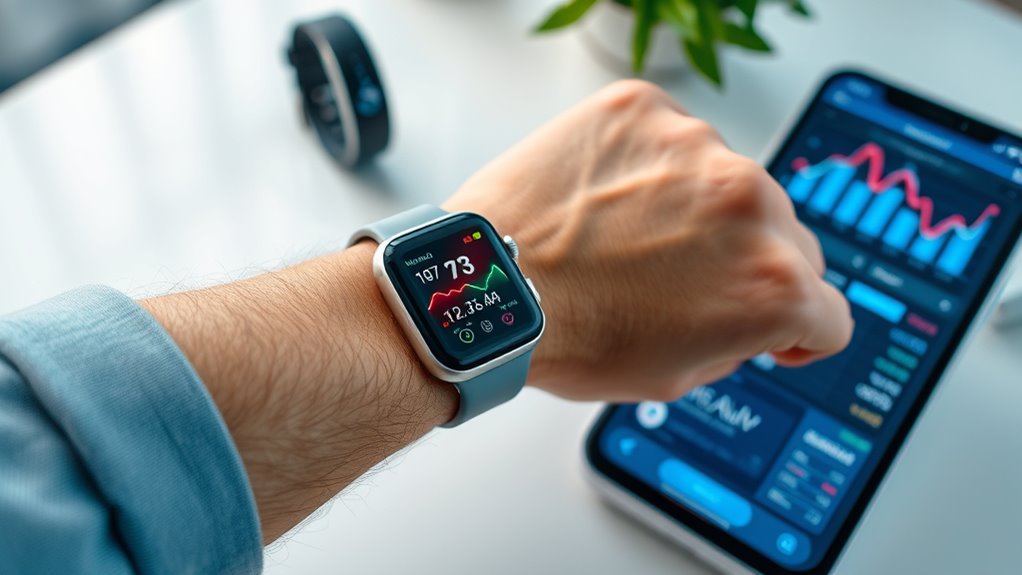Wearable health devices with AI analytics let you monitor your essential signs, activity levels, and overall wellness in real time. They provide personalized insights, helping you set goals and track progress easily. AI-powered features can detect early health issues and motivate you through engaging feedback. By choosing reputable devices and understanding data privacy, you can enjoy safer, more effective health management. If you keep exploring, you’ll discover how these tools can truly empower your wellness journey.
Key Takeaways
- Wearable health devices collect real-time data on vital signs, enhanced by AI analytics for personalized health insights.
- AI algorithms analyze wearable data to detect patterns, predict health risks, and provide early warnings.
- User engagement features like goal-setting and notifications improve health management effectiveness.
- Data privacy and security are crucial, with reputable devices implementing encryption and transparent policies.
- Transparent design and user-friendly interfaces foster trust, encouraging consistent use and better health outcomes.

Wearable health devices are transforming how you monitor and manage your well-being, especially when combined with AI analytics. These gadgets, from fitness trackers to smartwatches, give you real-time insights into your health metrics, making it easier to stay on top of your goals. But as you dive deeper into this technology, concerns about data privacy become more prominent. You want to know that your personal health information is protected and isn’t falling into the wrong hands. Reputable manufacturers implement strict encryption and anonymization protocols to safeguard your data, but it’s also essential for you to stay informed about how your data is used and shared. Understanding these privacy policies helps you make smarter choices about which devices to trust and how to configure your settings to keep your information secure.
Protect your health data by understanding privacy policies and choosing reputable wearable devices.
At the same time, user engagement plays an indispensable role in the effectiveness of wearable health devices. The more involved you are, the more you’ll benefit from the insights these devices provide. Many wearables incorporate gamification, personalized notifications, and goal-setting features to keep you motivated. When you actively participate—tracking your progress, responding to alerts, and adjusting your routines—you create a feedback loop that enhances your health journey. AI analytics further personalize your experience, analyzing patterns over time to offer tailored advice and early warnings about potential health issues. This dynamic interaction encourages you to stay committed and makes managing your health feel less like a chore and more like an empowering activity.
However, maintaining high user engagement requires intuitive interfaces and meaningful feedback. If a device’s app is complicated or the data it presents is overwhelming, you might lose interest quickly. Developers who prioritize user-friendly design and clear communication foster stronger engagement. Additionally, transparency about how AI processes your data and generates insights builds trust, encouraging you to rely on these tools consistently. When you see tangible progress and understand how your actions influence your health, you’re more likely to stay committed and integrate these devices into your daily routine. Incorporating space and organization strategies can also help you create a dedicated, clutter-free environment that supports your health goals and digital routines.
In the end, wearable health devices paired with AI analytics offer immense potential for improving your health management. But the benefits hinge on your awareness of data privacy and your active engagement. By choosing trustworthy devices, understanding privacy policies, and staying involved in your health process, you maximize the positive impact of this technology. It’s about creating a partnership where your data is protected, and your efforts are supported by smart, personalized insights. This approach helps you not only monitor your health more effectively but also feel confident and motivated as you work toward your wellness goals.
Frequently Asked Questions
How Accurate Are Wearable Devices Compared to Medical-Grade Equipment?
Wearable devices are generally less accurate than medical-grade equipment, but their data reliability has improved with better device calibration. While they provide useful health insights, you shouldn’t rely solely on them for critical medical decisions. Keep in mind that calibration issues can lead to discrepancies, so use wearable data as supplementary information rather than definitive diagnosis tools. For accurate health assessments, always consult healthcare professionals.
What Are the Privacy Concerns With AI Data Collection?
You should be aware that AI data collection raises privacy concerns, especially regarding data security. Your sensitive health information could be vulnerable if not properly protected. Always make certain you provide informed consent before sharing data, understanding how it’s used and stored. Companies might share or sell your data without your knowledge, so staying informed and cautious helps protect your privacy in this digital age.
How Do AI Algorithms Personalize Health Recommendations?
You might be surprised to learn that 80% of users get tailored health tips from AI. Personalization algorithms analyze your health data, like activity levels and sleep patterns, to understand your unique needs. Then, they utilize this data analysis to recommend specific workouts, diet plans, or wellness tips. This process guarantees your health advice is customized, making it more effective and relevant to your lifestyle.
Can Wearable Devices Detect Rare Health Conditions?
Yes, wearable devices can sometimes detect rare health conditions by analyzing genetic markers and monitoring early symptom detection. You benefit from continuous data collection, which helps identify unusual patterns that might indicate a rare issue. AI algorithms process this information to flag potential concerns early on. While not foolproof, these devices offer a valuable tool for catching rare conditions sooner, prompting you to seek medical advice promptly.
What Is the Cost Range for Advanced Wearable Health Tech?
Imagine holding a sleek, high-tech gadget in your hand, blending innovation with affordability. Advanced wearable health tech costs vary widely, from around $50 for basic models to over $500 for premium devices with cutting-edge features. This cost variability impacts device affordability for many users, making it accessible to some and a luxury for others. You can find options that fit different budgets, balancing technology and price to meet your health monitoring needs.
Conclusion
As you wear these devices daily, you might find unexpected moments of clarity—like catching an early sign of illness or simply feeling more in tune with your body. It’s almost surprising how technology and your own health can intertwine so seamlessly, turning everyday routines into opportunities for better well-being. Sometimes, the smallest coincidence—a sudden insight or a subtle shift—can remind you how connected you are to your health, just waiting to be uncovered.









